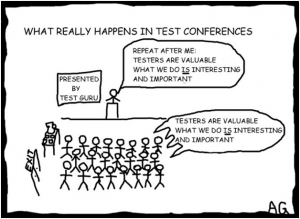THE RELEVANCE AND IRRELEVANCE OF TESTING CONFERENCES
January 14, 2014
In the world of quality & testing there are many conferences which have “testing” as their main theme. The reason why to attend is quite common: to get inspired by different thoughts, to have access to a broad network, to attend presentations and workshops, all in an enjoyable atmosphere. And that makes sense for the audience. It takes you really out of your daily comfort zone as a tester.
Moreover, testing is evolving rapidly and covers a lot of different aspects, so one can’t easily say that testing has no more secrets for him or her. There is always something to learn.
Looking at all these conferences I could also say these are irrelevant in some way. Testing is only one part of Software Development Lifecycle. In order to really make a difference in delivering qualitative software, there is more needed than only good and efficient testing. We need good planning, a transparent scope definition, an open collaboration mindset of all people involved, direct communication, risk impact analysis, etc.
And even if testing is done in the best possible way, then still this no guarantee for any testing – let alone project – success. The IT chain is only as strong as the weakest link: the real quality and efficiency lies in a good interaction between all project stakeholders.
Testing conferences, however, are only mainly talking about testing topics by testing people. In that sense, it is a missed chance. Maybe a project manager sees efficient testing in a complete different way? At least, it can bring new ideas and views for the tester.
The primary goal should not be making testing and testers better, but to make the project successful. So this is a warm appeal for opening the scope of testing conferences to other IT topics and speakers, and also to another non-testing audience. In other words: follow the (agile) trend of a cross-disciplined approach instead of organizing silo-based conferences because of any “practical” or any marketing related principle.

 English | EN
English | EN 
 more–>
more–>